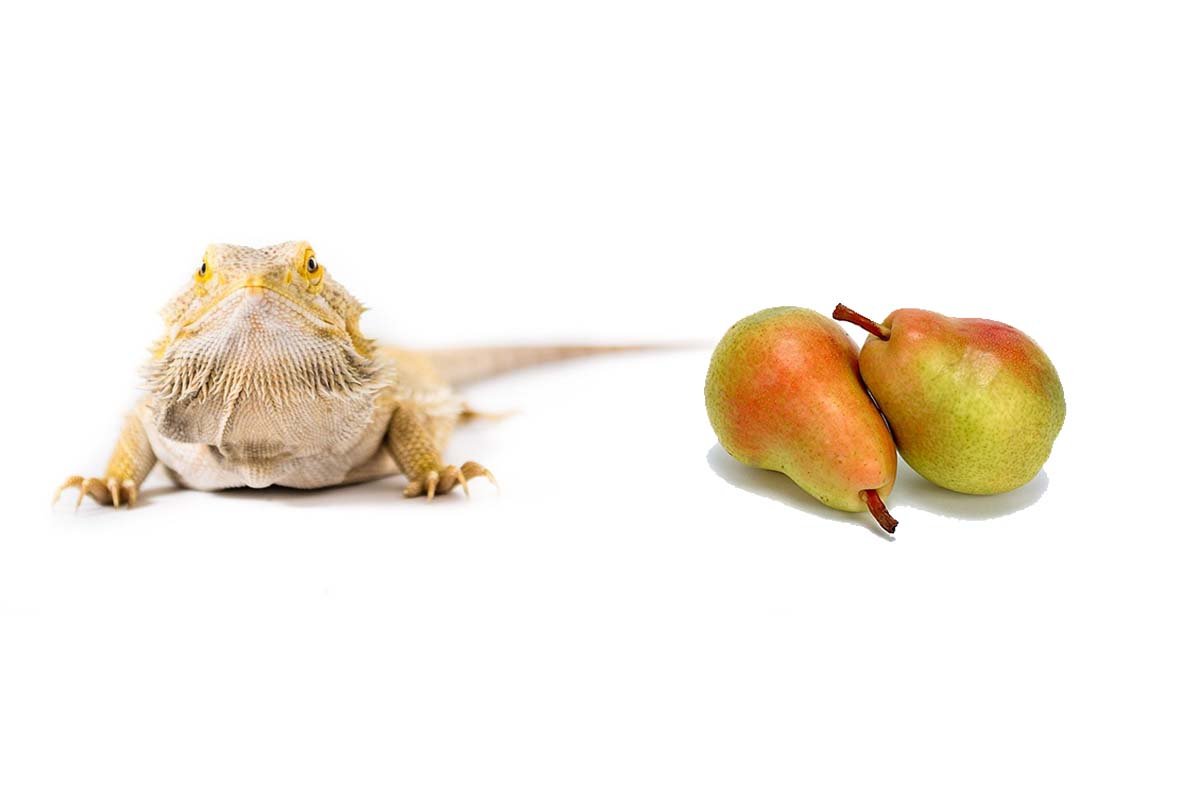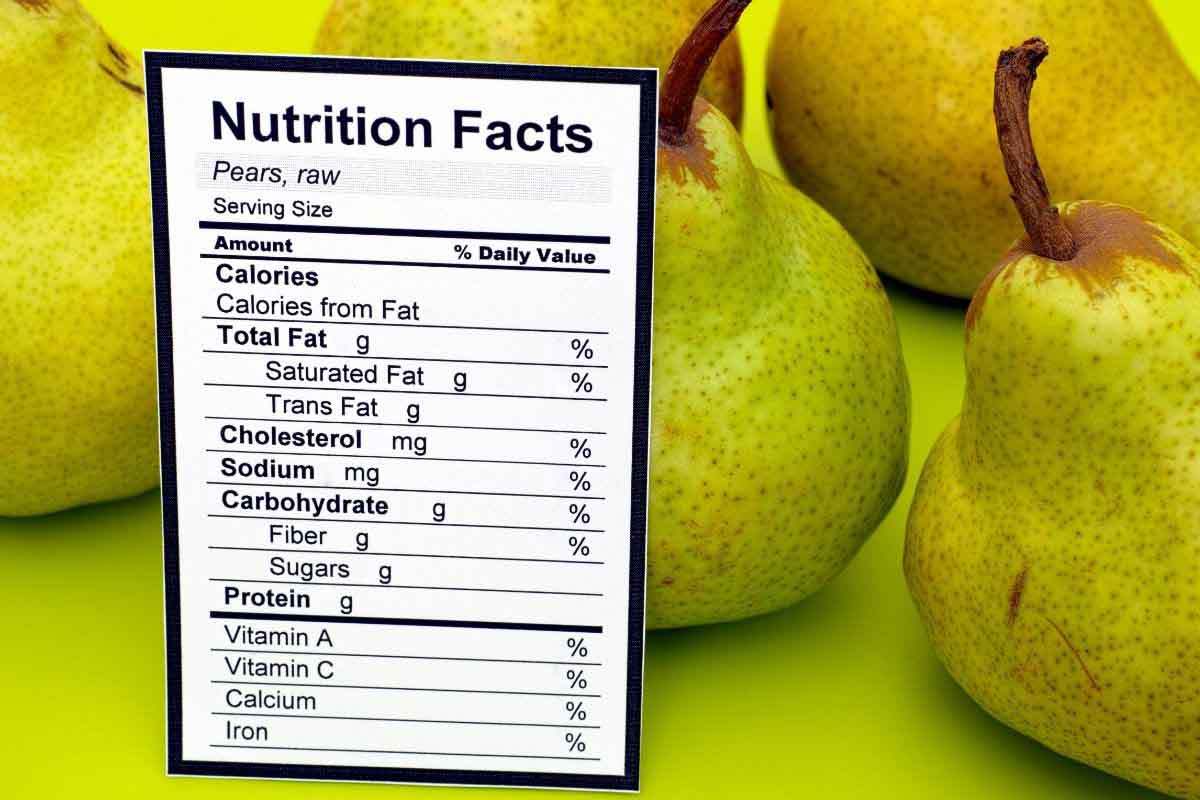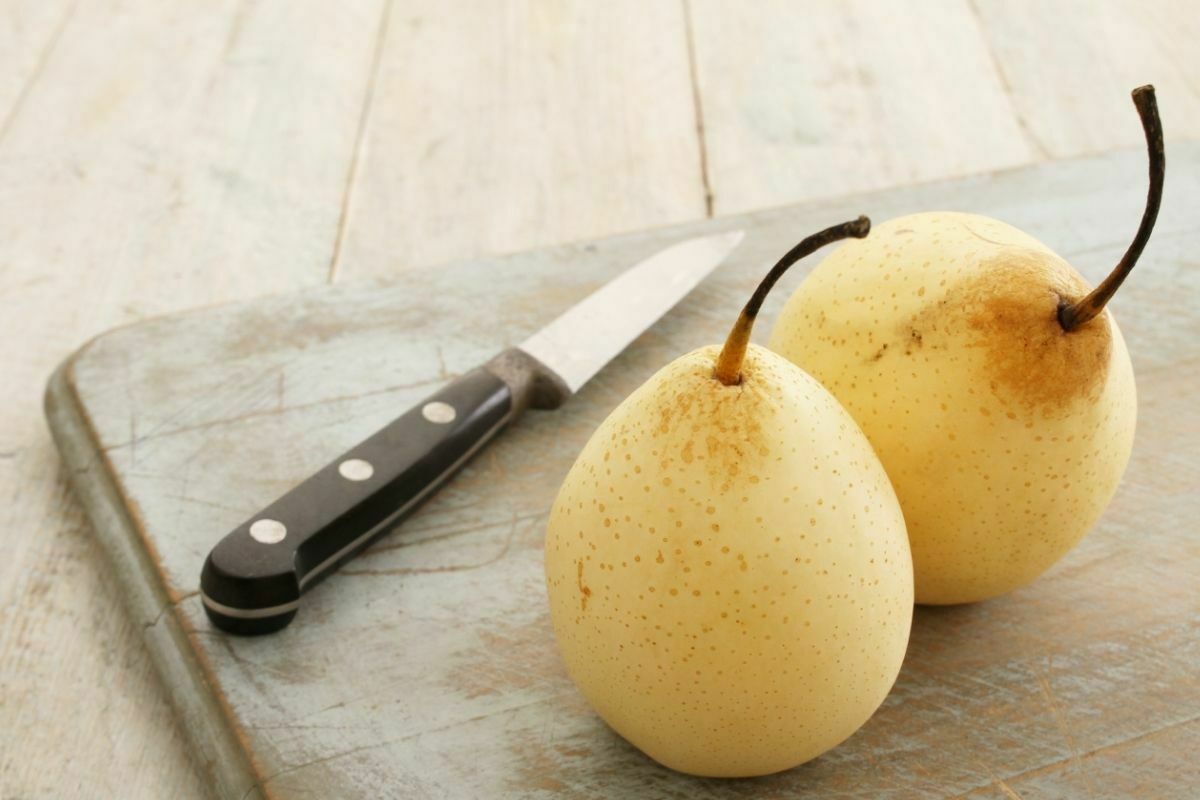Bearded dragons are reptiles native to Australia. They are also known as monitor lizards or simply monitors. Bearded dragons are very friendly animals, and they love to play.

If you have a domesticated bearded dragon, you’ll also know that these reptiles have a pretty big appetite and a bit of a sweet tooth.
If you want to share your love for the humble pear with your bearded dragon, we’re here to tell you if it’s safe to do so and share the nutritional ins and outs. Let’s dive in.
What Do Bearded Dragons Eat?
When it comes to what your bearded dragon eats, there is no one-size-fits-all answer. It depends on who you ask and how much information you get from them.
Some people say that bearded dragons eat almost anything, while others say that they only eat insects and worms. But this isn’t entirely true.
Bearded dragons tend to thrive when their diet consists primarily of live insects and vegetables. However, some foods can be harmful to your bearded dragon. These include:
Fruits and Vegetables – While many people think that fruit and vegetables are great for bearded dragons, this is not always the case. Many fruits contain high levels of sugar, which can cause problems for your bearded dragon.
This includes bananas, apples, grapes, pears, watermelons, melons, strawberries, oranges, and more.
Even though your bearded dragon may enjoy eating these items, they should never be fed too often because it will lead to obesity and other health issues.
Nuts and Seeds – As mentioned above, nuts and seeds are high in fat and calories. In fact, almonds are considered the most nutritious nut out there. However, even they are very hard to digest for a bearded dragon.
This means that your bearded dragon won’t be able to absorb nutrients from them properly. Instead, they will pass through your reptile without any benefit.
Raw Meat – You might be thinking, “Why would I feed my bearded dragon raw meat?” There are several reasons why you would want to give it to them. First off, it’s easy to prepare. Second, it’s cheap and healthy.
Third, it tastes delicious! (To them, anyway). And lastly, it’s a good source of protein.
The downside is that it contains many bacteria, parasites, and viruses. This could potentially harm your bearded dragon.
So make sure that you thoroughly wash your hands after handling raw meats, and don’t let your bearded dragon eat raw chicken or beef. Those are higher-risk foods.
Foods Containing Salt – There are two types of salt that you should avoid feeding your bearded dragon. One type of salt is sodium chloride, commonly referred to as table salt. Table salt is used in cooking food and baking bread.
It’s also added to processed foods like soups, sauces, and salad dressings. Because of its high concentration, it’s hazardous for your bearded dragon.
They’ll quickly become obese if you keep giving them large amounts of table salt.
The second kind of salt is potassium chloride. This salt is used as an electrolyte supplement for reptiles. It helps regulate body temperature but can also be toxic to your bearded dragon.
If you notice that your bearded dragon has been acting sluggish lately, you should immediately take him/her to the vet.
Can Your Bearded Dragon Eat Pears?
Pears are one of the most popular fruits in the world. They’re sweet, juicy, and have a beautiful green or red color. The good news is that, in moderation, there’s no reason why your bearded dragon can’t enjoy eating pears.
Remember, though, your bearded dragon isn’t a herbivore, and it will require a diet that consists primarily of animal protein to stay alive.
As an occasional snack, though, pears can be a healthy and delicious addition to your bearded dragon’s diet.
As a general rule of thumb, fruits and vegetables should make up no more than 20% of your bearded dragon’s diet – balance is key!
Pears – Nutritional Information For Bearded Dragons

Adding pears as an occasional treat to your bearded dragon’s diet can be beneficial for their health. So let’s take a closer look at the nutritional profile of the average pear, and assess the health benefits (and risks) for your dragon.
Pear – Nutritional Profile
Nutrition Facts: 1 medium pear provides about:
- Calories: 70
- Fat: 0g
- Carbs: 18g
- Fiber: 2g
- Sodium: 0mg
- Potassium: 50mg
- Protein: 1g
- Vitamin C: 4.3mg
- Vitamin A: 0 mcg
- Calcium: 10mg
- Iron: 0mg
As you can see, the dominant nutritional components of pear are carbs, fiber, potassium, protein, vitamin c, and calcium. So are these healthy for your bearded dragon? Let’s find out.
Can Bearded Dragons Eat Carbohydrates?
Yes, they can. In fact, they need carbohydrates to survive. But not all carbohydrates are created equal. Some are better than others when keeping your bearded dragon healthy.
Carbs come in many different forms, including sugars, starches, and fibers. These carbohydrate sources have unique properties that affect how well they support your bearded dragon’s overall health.
Carbohydrates provide energy, and they make up an essential part of the bearded dragon food pyramid.
Can Bearded Dragons Eat Fiber?
Yes, bearded dragons love to eat fiber. Fiber is found in both plant-based and non-plant-based foods.
When choosing what to feed your bearded dragon, remember that he needs a balanced diet with plenty of vitamins, minerals, proteins, fats, and carbohydrates.
Fruits and veggies are rich in fiber, while grains and other starchy foods contain less fiber. Bearded dragons need 20-35% fiber in their diets on a dry matter basis.
Is Potassium Good For Bearded Dragons?
Yes, it is. Potassium is another important mineral that plays a vital role in maintaining proper bodily functions. It’s essential for reptiles because they don’t sweat as mammals do.
Instead, they rely on water loss through panting and breathing to cool themselves off.
This process requires a lot of energy, which means that your bearded dragon must consume enough potassium to keep its body running smoothly.
Is Calcium Good For Bearded Dragons?
Bearded dragons need calcium just like humans do. Calcium helps maintain strong bones and teeth and aids in muscle contraction. If your bearded dragon doesn’t get enough calcium, it may suffer from bone disease or tooth decay.
Luckily, calcium is abundant in many common foods, including milk, cheese, yogurt, and leafy greens. In addition, you can supplement your bearded dragon’s diet with calcium supplements if necessary.
Although pears do contain calcium, they don’t contain enough of your bearded dragon’s daily intake, so don’t rely on them to provide the whole lot.
Instead, you may need to offer your bearded dragon calcium supplements or feed them other high-calcium foods to help them reach their recommended daily intake.
Do Bearded Dragons Need Iron?
No, they don’t. Although iron is an essential nutrient for most animals, it isn’t required by reptiles. They have a special organ called hemoglobin that stores iron inside their blood cells.
Hemoglobin allows them to carry oxygen throughout their bodies without using muscles. Reptiles generally don’t need supplemental iron since they produce this substance naturally.
However, some bearded dragons may be prone to developing anemia if they’re fed low-quality diets. Try feeding your lizard a high-quality reptile diet that includes fresh vegetables and fruits to avoid this problem.
Do Bearded Dragons Need Vitamin C?
Yes, they do! Vitamin C is one of the best antioxidants available. Antioxidants help prevent cell damage caused by free radicals, which are unstable molecules that can cause harm to our bodies.
Free radicals are often produced during normal metabolic processes, but they can also form when we breathe polluted air.
The good news is that vitamin C works quickly to neutralize free radicals before they can wreak havoc, and this is just as true for your bearded dragon!
Are Pears Healthy For Bearded Dragons?
The short answer is yes. They’re high in vitamin C and low in calories, making them great for bearded dragons. But you should still make sure that your bearded dragon gets plenty of protein, fat, and carbs.
These three nutrients promote healthy growth, digestion, and metabolism.
However, there is one thing we haven’t covered yet: oxalates.
What Are Oxalates
Pears are delicious: fact; however, they’re also known for containing oxalates.
Oxalates (or oxalic acid) are a natural compound found in most fruits and veggies. Oxalates can bind to calcium during digestion and leave the body through the stool.
If you feed your bearded dragon foods that are high in oxalates, they will struggle to digest calcium correctly and may receive next to none of its nutritional benefits.
This is bad news for bearded dragons of all ages, but it’s particularly detrimental to any baby beardies who are still growing.
Calcium is one of the most essential nutrients in your bearded dragon’s diet, and any foods that inhibit the digestion and absorption of calcium are bad news.
However, although pears DO contain oxalates, there are a lot of misconceptions about just how high in oxalates they are. On average, pears contain around 2 mg of oxalates per fruit.
The good news is that, on its own, this is not enough to impair your bearded dragon’s health or digestion. Because pears can only be given to bearded dragons in small quantities, there’s no real risk to their health.
However, if you offer your beardie pear regularly, this will definitely cause issues, not just in regards to oxalates.
How Many Pears Should You Feed A Bearded Dragon?
If you want to give your bearded dragon pears, then you’ll need to figure out how much pear he needs each day. A single medium-sized pear contains about 5 grams of fiber.
So if your bearded dragon eats two medium pears per day, he will receive 10 grams of fiber. That’s more than half his recommended daily allowance. And remember: Fiber is essential for your bearded dragon’s health.
It keeps him regular, promotes digestive health, and prevents constipation.
However, pear is also high in fructose, which can damage your bearded dragon in large quantities. Fructose is found in fruit, honey, and table sugar and has been linked to obesity, diabetes, heart disease, and liver problems.
Although fruit has its health benefits, it’s nutritionally poor for bearded dragons. It also contains high levels of sugar. Bearded dragons struggle to digest sugar in large quantities, and it can also cause issues with their teeth and gums.
We wouldn’t recommend feeding your bearded dragon pear daily. However, there’s no harm in offering it as a sweet treat (in small quantities) a few times a week.
How Should You Prepare Pear For A Bearded Dragon?

Before you feed your bearded dragon pear, it’s always best to let them ripen first. When pears are ripe, they’re softer and easier to eat and digest, which will be a healthier (and more enjoyable) experience for your bearded dragon.
Most importantly, you should ALWAYS peel off the skin and only feed your bearded dragon the inside of the fruit.
Remember to cut your pear up into small, bite-sized pieces (preferably cubes), and it’s best to serve pear with other fruits, veggies, or live insects, to offer your bearded dragon a more balanced diet.
Are Pear Seeds Safe For Bearded Dragons?
There’s a lot of conflicting information about this topic, so we will try to clarify it.
In short, you shouldn’t give your bearded dragon pear seeds.
Whether or not these seeds can damage your bearded dragon’s health or digestion is unknown, and that’s precisely why most vets recommend removing them before preparing a pear as a snack.
Pear seeds are quick and straightforward to remove; in truth, there’s no reason you should be offering them to your bearded dragon when you can get rid of them in just a few seconds.
Like most reputable vets, we recommend ALWAYS removing the seeds from your pears before feeding your dragon. It’s not worth the risk.
The Bearded Dragon Food Pyramid
To give your bearded dragon a healthy and balanced diet, you need to understand the bearded dragon food pyramid. Let’s take a brief look at what this means below.
- Fruits: 1 day a week
- Vitamins/Minerals/Calcium: 3 days a week
- Vegetables: 4 days a week
- Insects: 6 days a week
- Leafy Greens: 7 days a week
As you can see, the pyramid rates from bottom to top in terms of which foods are most important. In moderation, each food group is necessary to nurture a healthy and happy bearded dragon.
Leafy greens are one of the most important parts of a bearded dragon’s diet. Raw plant material accounts for just over 50% of a bearded dragon’s stomach content in the wild!
Everyday greens should be rich in calcium and low in phosphorous and oxalates. Escarole, dandelion greens, and watercress are highly recommended.
Insects are another vital part of a beardies diet, and in the wild, 42% of their stomach content consists of live insects.
Insects contain essential vitamins and nutrients such as thiamin, vitamins B1, A, and E. Cockroaches and crickets are two of the most popular choices.
Vegetables should also not be overlooked. Ideal veggies for your bearded dragon will be brightly colored and not high in oxalates.
You can try feeding your bearded dragon veggies such as butternut squash, bell peppers, and pumpkin to provide a balanced diet.
Vitamins, minerals, and calcium should also be a priority. If you’re feeding your bearded dragon a balanced diet, they should naturally get these from their food sources.
However, if you’re concerned, adding a supplement to their diet is no harm. Most bearded dragons are calcium deficient, so calcium supplements are highly recommended.
As you can see, fruit is at the bottom of the priority list. Fruit is tasty and enjoyable for your bearded dragon, and while it does contain some health benefits, it shouldn’t be offered daily.
Instead, think of fruits as more of a sweet treat and a flavor enhancer rather than an essential food to survive.
Frequently Asked Questions
Can Bearded Dragons Eat Plums?
Yes, plums are safe for bearded dragons. They have a very mild taste and are high in fiber and potassium. Just like with other fruits, make sure only to offer them once a week.
What Fruit Can Bearded Dragons Eat?
There are many different types of fruit that bearded dragons can eat. Here are some of our favorites:
– Apples
– Apricots
– Avocados
– Bananas
– Blackberries
– Blueberries
– Cherries
– Grapes
What Do Baby Bearded Dragons Eat?
Baby bearded dragons eat a lot of the same things as adult bearded dragons. The main difference between baby and adult bearded dragons is that babies tend to eat less. This is because they don’t require much energy or nutrition.
They become more active and need more calories and nutrients as they grow older.
Final Thoughts
If you want to feed your bearded dragon a nutritious diet, you’ll need to make sure they get plenty of leafy greens. These are the foundation of any good diet.
After this, you can add in various other foods, such as pears, to keep them happy and healthy.
There’s no reason your bearded dragon can’t enjoy pear a few times a week, but remember to provide them with a balanced diet and reduce excessive sugar intake to keep them healthy!
